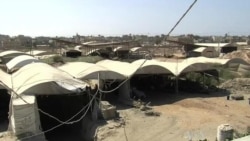RAFAH, GAZA STRIP —
Gaza's economy has been hit hard by the recent destruction of most of the smugglers' tunnels into Egypt's Sinai Peninsula. The tunnels provided an economic lifeline to Gaza, which is under a seven-year-old Israeli blockade. But Egypt says the tunnels were being used by Islamist militants to stage attacks in Sinai.
It is a quiet weekday morning along Gaza’s boundary with Egypt. Activity in this economic lifeline for the Palestinian territory has virtually stopped since Egyptian security forces began destroying the hundreds of smuggling tunnels here.
A few tunnels are still open, mostly kilometer-long ones that go beyond a 500-meter-wide buffer zone set up by Egyptian forces.
The Egyptians began destroying the tunnels after the military coup in early July. Before then, thousands of tons of food, fuel, construction materials and machinery entered Gaza through the tunnels each month. This eased shortages caused by the Israeli blockade imposed after the militant Hamas took power in Gaza.
Tunnel owner Abu Khalil does not want his face shown on camera. He says his business has been destroyed.
“There are a lot of people sitting without work now," he said. "This has made the rate of unemployment very high. And prices for goods have become very expensive."
Tens of thousands of jobs have been lost. Many gas stations now are shut. Construction projects have stopped. Raw sewage flows into the sea because the treatment plant no longer works. Electrical power is being rationed. Analysts say the closure of the tunnels have cost Gaza some $300 million.
Islam Salouha's grocery store is open despite a blackout. He says business is down 70 percent. Most goods come from Israel and cost twice as much. The uncertain future makes it difficult to stay in business.
"We buy some consumer products week by week, others day by day," he said. "For example, cigarettes you buy day by day, the other consumer products, week by week. Because we are afraid if we buy them at the higher price and the price goes down we will lose money."
Egypt says militants are using the tunnels to attack its forces in Sinai. Hamas denies that.
The new Egyptian leader, General Abdel Fattah el-Sissi, is suspicious of the ties between Hamas and Egypt's ousted Islamist president Mohamed Morsi, deposed by the military three months ago, says Professor Mukhaimar Abu Saada of Al-Azhar University in Gaza.
“Basically Hamas is part of the international Muslim Brotherhood organization and el-Sissi and his comrades were watching how the Hamas Muslim Brotherhood was developing over the past year when Morsi was in power," he said. "And they were not happy with it."
Hamas leaders say they are trying to improve ties with Egypt's new leaders but this may take time. Gazans, meanwhile, say they just want the tunnels re-opened or legal trade to be allowed through Rafah Crossing.
It is a quiet weekday morning along Gaza’s boundary with Egypt. Activity in this economic lifeline for the Palestinian territory has virtually stopped since Egyptian security forces began destroying the hundreds of smuggling tunnels here.
A few tunnels are still open, mostly kilometer-long ones that go beyond a 500-meter-wide buffer zone set up by Egyptian forces.
The Egyptians began destroying the tunnels after the military coup in early July. Before then, thousands of tons of food, fuel, construction materials and machinery entered Gaza through the tunnels each month. This eased shortages caused by the Israeli blockade imposed after the militant Hamas took power in Gaza.
Tunnel owner Abu Khalil does not want his face shown on camera. He says his business has been destroyed.
“There are a lot of people sitting without work now," he said. "This has made the rate of unemployment very high. And prices for goods have become very expensive."
Tens of thousands of jobs have been lost. Many gas stations now are shut. Construction projects have stopped. Raw sewage flows into the sea because the treatment plant no longer works. Electrical power is being rationed. Analysts say the closure of the tunnels have cost Gaza some $300 million.
Islam Salouha's grocery store is open despite a blackout. He says business is down 70 percent. Most goods come from Israel and cost twice as much. The uncertain future makes it difficult to stay in business.
"We buy some consumer products week by week, others day by day," he said. "For example, cigarettes you buy day by day, the other consumer products, week by week. Because we are afraid if we buy them at the higher price and the price goes down we will lose money."
Egypt says militants are using the tunnels to attack its forces in Sinai. Hamas denies that.
The new Egyptian leader, General Abdel Fattah el-Sissi, is suspicious of the ties between Hamas and Egypt's ousted Islamist president Mohamed Morsi, deposed by the military three months ago, says Professor Mukhaimar Abu Saada of Al-Azhar University in Gaza.
“Basically Hamas is part of the international Muslim Brotherhood organization and el-Sissi and his comrades were watching how the Hamas Muslim Brotherhood was developing over the past year when Morsi was in power," he said. "And they were not happy with it."
Hamas leaders say they are trying to improve ties with Egypt's new leaders but this may take time. Gazans, meanwhile, say they just want the tunnels re-opened or legal trade to be allowed through Rafah Crossing.





